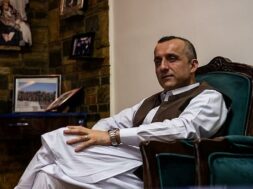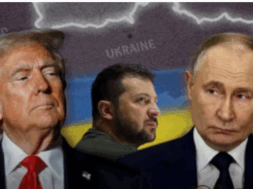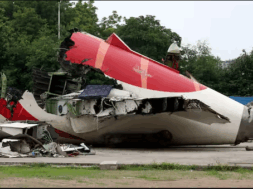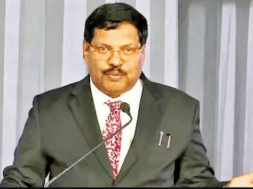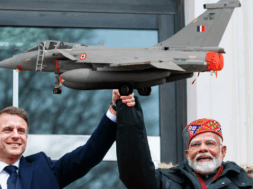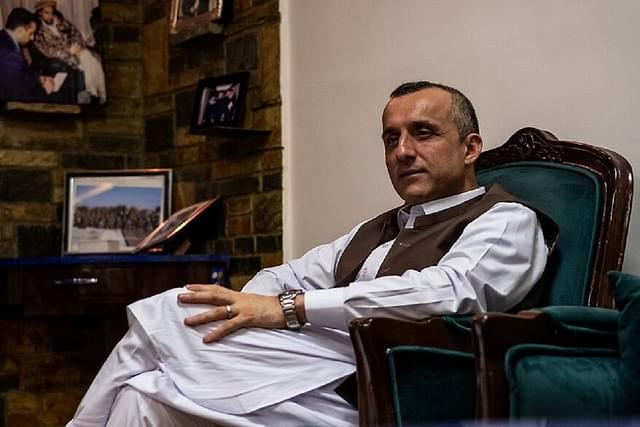
Resistance Force Claims to Have Inflicted Heavy Blows to Taliban
Manas Dasgupta
NEW DELHI, Aug 28: Even as the Taliban deployed extra forces around Kabul’s airport on Saturday to prevent large crowds from gathering after a devastating suicide attack two days earlier, the militant group is claimed to have suffered heavy casualties in Afghanistan’s Kapisa province, as the resistance force under former vice president Amrullah Saleh gave a fitting reply to the insurgent group.
The clashes are taking place in Sanjan in Kapisa province and Khost Wa Fereng district in Baghlan. The resistance forces are also giving the Taliban a tough fight in Panjshir province, forcing the Sunni Pashtun group to pull back. The counter-attack is a result of violation of ceasefire by the Taliban in Panjshir, media reports claimed.
Panjshir is the only province not captured by the Taliban, which seized power in Afghanistan earlier this month in the wake of withdrawal of US forces. The counter-attack comes days after terror group Islamic State carried out blasts near the Kabul airport in which more than 200 people including 13 American soldiers, were killed.
The Panjshir resistance forces had entered into an agreement earlier not to attack each other till a regular government was installed in Kabul and an understanding reached over is formation. Guarding from a height of the narrow valley gorge, which was the only entry point to Panjshir, the resistance forces are sitting at an advantageous point, but still the Taliban were learnt to have violated the agreement and opened fire on the guards.
After the Kabul airport attack, the self-styled “new Afghanistan president” Saleh had asked the world to unite against terrorism. “The world must not bow to terrorism. Let’s not allow Kabul airport to be the site for humiliation of humanity & “rules based world order”. Let’s believe in our collective effort and energy. Defeatist psyche puts you under risk more than terrorists. Don’t die psychologically,” he tweeted on Friday
He also took on the Taliban for distancing themselves from the Islamic State. Saleh said the Taliban have learnt it from their master Pakistan to deny their links with ISIS.
There is still confusion between the factions of Taliban about forming an Islamic Emirate in Afghanistan. According to reports from Afghanistan, the Haqqani network has taken control of the capital city led by Anas Haqqani, brother of Sirajuddin Haqqani, head of the terrorist group and deputy leader of the Taliban. Sirajuddin Haqqani is said to be passing instructions from Quetta.
The Taliban faction headed by Mullah Yaqoob, son of late Mullah Omar and head of Taliban military commission, is eyeing Kandahar, the traditional seat of Pashtuns. Taliban leader Abdul Ghani Barader met Mullah Yaqoob after he arrived from Doha on August 18. It was here in Kandahar that Mullah Yaqoob’s father was declared Emir ul Momeen on April 4, 1996. The religious head of Taliban, Mullah Haibatullah Akundzada, is still based in Karachi in Pakistan.
Media reports from Kabul airport said even as the massive U.S.-led airlift wound down ahead of an August 31 deadline, new layers of checkpoints sprang up on roads leading to the airport, some manned by uniformed Taliban fighters with Humvees jeeps and night-vision goggles captured from Afghan security forces. Areas where large crowds of people have gathered over the past two weeks in hopes of fleeing the country following the Taliban takeover were largely empty.
Following Thursday’s bomb explosion there are concerns that the IS-K group, which is far more radical than the Taliban, could strike again. Many Western nations have completed their evacuation operations ahead of Tuesday’s deadline for the withdrawal of all U.S. forces.
An Afghan who had worked as a translator for the U.S. military said he was with a group of people with permission to leave who tried to reach the airport late on Friday. After passing through three checkpoints they were stopped at a fourth. An argument ensued, and the Taliban said they had been told by the Americans to only let U.S. passport-holders through.
“I am so hopeless for my future,” the man lamented after returning to Kabul. “If the evacuation is over, what will happen to us?” On Saturday, the Taliban fired warning shots and deployed some kind of coloured smoke on a road leading to the airport, sending dozens of people scattering. More than one lakh people have been safely evacuated through the Kabul airport, according to the U.S., but thousands more are struggling to leave and may not make it out by Tuesday.
A U.N. agency meanwhile warned that a worsening drought threatens the livelihoods of more than seven million people. The Rome-based Food and Agriculture Organization said Afghans are also suffering from the coronavirus pandemic and displacement from the recent fighting.
Earlier this month, the U.N. World Food Program estimated that some 14 million people — roughly one out of every three Afghans — urgently need food assistance.
President Joe Biden has said he would adhere to a self-imposed August 31 deadline for withdrawing all U.S. forces. The Taliban, who control nearly the entire country outside Kabul’s airport, have rejected any extension.
Italy said it would work with the United Nations and countries bordering Afghanistan to continue helping Afghans who had worked with its military contingent to leave the country.
“Our imperative must be to not abandon the Afghan people,” especially women and children, Italian Foreign Minister Luigi Di Maio said Saturday. He said 4,890 Afghans were evacuated by Italy’s air force on 87 flights, but did not say how many others were still eligible.
The Taliban have encouraged Afghans to stay in the country, pledging amnesty even to those who fought against them. They have said commercial flights will resume after the U.S. withdrawal, but it’s unclear if airlines will be willing to offer service.
The U.S. and its allies have said they would continue providing humanitarian aid through the U.N. and other partners, but any broader engagement — including development assistance — is likely to hinge on whether the Taliban deliver more moderate rule as promised by the conquering Taliban earlier.
